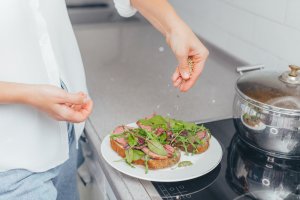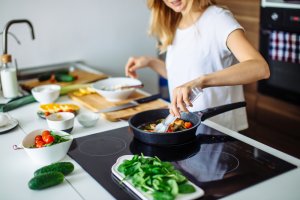4 Benefits of Cooking in Recovery
For people in early addiction recovery, finding new and interesting activities to engage in that do not involve alcohol and drugs can be a challenge. But incorporating one or more sober hobbies into your new lifestyle can help strengthen your recovery and improve your overall quality of life. Honing your cooking skills is an excellent way to incorporate a fun and safe hobby into your routine while also developing an important life skill. Here are some of the biggest benefits of sober cooking.
1. It’s Good for Your Physical Health
When active in addiction, people tend to neglect their health. This often manifests as poor eating habits, whether it’s eating too much, not eating enough, or choosing processed foods over nutritious, well-rounded meals. One of the best ways to boost your physical health in early recovery is to be mindful of what you put into your body. Studies have shown that people who cooked meals for themselves tend to eat more fruits and vegetables and have lower body fat percentages than those who always eat out. In addition to knowing every ingredient that’s going into your food (and therefore, into your body), sober cooking is also a great way to save a little money.
2. It’s Good for Your Mental Health
Poor eating habits can also affect your mental health, which is just as important to maintain as physical health when it comes to preventing relapse. Researchers have found that a high intake of sugar, junk food, processed meats, and other unhealthy foods can increase a person’s risk of depression and/or anxiety. When you prepare meals for yourself, it’s much easier to avoid these highly processed pitfalls and incorporate nutritious items like fruits, veggies, whole grains, nuts, and lean meats into your diet.
3. It’s Good for Your Brain
People in early recovery often experience post-acute withdrawal syndrome (PAWS), which can cause temporary cognitive impairments such as memory loss, concentration problems, and general brain fog. Sober cooking is an excellent activity for whipping your brain back in shape, as it involves practices several key cognitive skills affected by PAWS. Gathering and preparing ingredients, following a recipe, and working with different types of cooking equipment requires you to sharpen your attention span and improve your concentration. The more you cook, the more exercise you’ll give to your recovering cognition. You can start by making simple dishes for yourself, then work up to more complex meals for friends and family.
4. It’s Good for Socializing & Fellowship
Speaking of meals with family and friends, sober cooking can also help keep you connected with others, which is critical in recovery. Making meals with other people can be a great bonding experience, as it requires working together to create something great. It’s also an excellent way to start cooking in recovery as a beginner — you can start off with simple tasks such as cutting veggies or measuring ingredients and learn valuable tips and tricks from others.
Cooking In Recovery
Recovery is a lifelong process. While there are many strategies one can use to stay sober, finding activities that you enjoy and can do with friends is one of the strongest ways to keep sober. Cooking is one of many such activities that can benefit your recovery, social relationships, and your health.
